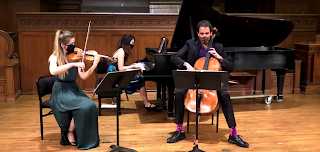Nicole Oswald, Alison Lee, and Isaac Pastor-Chermak playing Maurice Ravel’s trio on the altar of Old First Presbyterian Church (screen shot from the YouTube video of the concert being discussed)
Last night the Ensemble 1828 piano trio made its Old First Concerts debut. The group is the piano trio of violinist Nicole Oswald, cellist Isaac Pastor-Chermak, and pianist Alison Lee; and the collective name is taken after the year in which Franz Schubert died. At their debut in June of 2019, presented by Sunset Music and Arts in San Francisco, the program drew upon music from the final year of Schubert’s life. Thus, in addition to performing as a trio, they also presented solo and duo offerings. The full title of last night’s program was Vive la Différence: French music of the late 19th & early 20th centuries, advancing forward about 75 years from their namesake.
Their only performance as a trio took place after the intermission: Maurice Ravel’s 1914 trio in A minor. The first half of the program saw Lee accompanying two sonatas, César Franck’s A major violin sonata and Debussy’s cello sonata. Chronologically, Ravel’s trio was flanked by earlier and later sonata compositions. It thus served somewhat as a “central focus,” even if it was the last piece to be played. More important is that all three of these pieces experimented with departures from the usual structural conventions.
In Ravel’s case this is most evident in the third movement, Passacaille. This is a retrospective view of a seventeenth-century dance form in which any vestige of the dance has been shed in favor of a repeated pattern cast in a moody dark rhetoric. Ravel’s technical demands on all three instruments are imposing, and the passacaglia is the one movement in which those demands are somewhat eased. From the listener’s point of view, the trio stands out by virtue of the many adventurous sonorities Ravel evokes, the most chilling being the natural string harmonics that wistfully conclude the first movement. Ensemble 1828 admirably rose to all the demands imposed by the score, but their freshness of youth established a rhetorical context that made for new points of view of chamber music likely to be familiar to much of the audience.
The “sonata pairing” was particularly interesting when one recognizes that Franck was a significant influence on the young Debussy. Both of these sonatas were composed late in life, and each has its own way of departing from the usual sonata conventions. In Franck’s case this involves a particularly wistful opening movement and, more significantly, the replacement of the usual slow movement with a fantasia preceded by an extended recitativo. Oswald presented a solid command of the score, always establishing rhetorically appropriate grounds for interplay with Lee’s piano work. (Franck’s own “comfort zone” was the keyboard, both piano and organ. It is therefore no surprise that this sonata has the piano as a partner, rather than providing accompaniment.)
Debussy’s sonata was the first of a series of six (each with different instrumentation) that he planned towards the end of his life. He only lived to compose the first three. Debussy had originally given this sonata the subtitle “Pierrot fâché avec la lune” (Pierrot angry with the moon). The sonata was composed about three years after the first performance of Arnold Schoenberg’s “Pierrot Lunaire;” and whether or not this is more than coincidence is left as an exercise for the reader. At the very least Debussy had no trouble with a rhetoric as sharp-edged as one found in the “Pierrot Lunaire” libretto; and Pastor-Chermak not only recognized those edges but gave them just the right rhetorical twists.
Ensemble 1828 also prepared an encore. This was the winter movement from Astor Piazzolla’s Estaciones Porteñas (liberally translated as “the four seasons of Buenos Aires”). José Bragato prepared the arrangement for piano trio, and the Neave Trio recorded its entirety on their Celebrating Piazzolla album, then bringing it to a Noontime Concerts program in December of 2018. Ensemble 1828 perfectly captured the wistful melancholy of this particular movement, which seemed the perfect match for our current run of inclement weather.


No comments:
Post a Comment